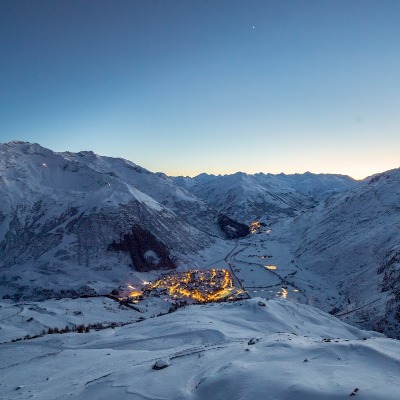U.S. Alpine Ski Team Announces Additions To 2021-22 Staff

Following spring planning meetings, the U.S. Alpine Ski Team has announced key staffing changes for the 2021-22 season, which has already kicked off with initial prep period camps at official training sites at Squaw Valley and Mammoth Mountain Ski Area, Calif.
Despite unforeseen challenges associated with COVID-19, the Land Rover U.S. Alpine Ski Team posted their best collective result in years, grabbing 18 podiums and four victories across five athletes—led by two-time Olympic champion and six-time world champion Mikaela Shiffrin, with three victories, and Olympian Ryan Cochran-Siegle with two podiums and his career-first World Cup victory. The staff worked tirelessly to follow protocols and keep their athletes safe and healthy, so athletes could focus on skiing.
As the U.S. Alpine Ski Team heads into an important Olympic year, with Beijing 2022 on the horizon, it is vital to have a solid, strong support staff behind the athletes recently nominated to Team. Alpine Director Jesse Hunt believes the adjustments made heading into the upcoming season, coupled with the fact that there is strong consistency in the program, will do just that.
On the men’s side, key changes include longtime U.S. Ski Team coach Forest Carey moving into the men’s head coach position, and another U.S. Ski Team coaching veteran Ian Garner working into the men’s head tech coaching role. Hunt is positively fired up for this adjustment for a number of reasons.
"The men's team is evolving in a positive direction with Forest Carey taking on the men's head coach role. He brings great operational expertise and coaching knowledge as well as respect from the current staff and athletes to the position. Filling in his footsteps as head tech coach will be his long-standing assistant Ian Garner. Forest and Ian have been the backbone of the World Cup tech side for many years, and their knowledge and experience will be embraced by the whole men's team."
“Ian has contributed his competency to every level of the U.S. Ski Team,” added Carey. “Our current athletes and Ian’s colleagues are fortunate to have him running the tech group.” The crew has been hard at work at Squaw Valley. Carey added, “We are going now with training. I look forward to providing the guys with all the support we can to help them reach the top.”
Other changes on the men’s tech side include Max Lamb making the move from Europa Cup assistant up to World Cup assistant tech coach, and Michael Bansmer as a new addition to the team in the Europa Cup assistant coach/strength and conditioning role. Bansmer joins the team from the Steamboat Springs Winter Sports Club (SSWSC) where he has been a successful men's FIS coach.
The men's speed side remains consistent with the exception of Canaan Pollock replacing longtime U.S. Ski Team employee Chris Beckman as a seasonal assistant coach, as Beckmann moves on to new challenges. Pollock grew up in West Virginia, but made the move westward to Squaw Valley, Calif., before landing in Switzerland with his wife. He has most recently coached for a regional team in Switzerland before joining the U.S. Ski Team.
On the women's side, all the key coaches are returning at every level which provides valued consistency moving into the Olympic year. The one addition to a veteran staff on the women's side will be Coley Oliver, who joins the Europa Cup staff as an assistant coach/strength and conditioning/athletic trainer. Having raced for the University of New Hampshire (UNH) Wildcats as an NCAA All-American, Oliver brings collegiate racing experience as well as academy (Stratton Mountain School) and international coaching experience (Team X Alpine) to the position.
Oftentimes, the team behind the team goes unnoticed as they work day in and day out to ensure athletes are set up for success. They are, as many would say, the “unsung heroes.” There are the servicemen who spend hours in the wax room, laboring over skis and tinkering with boots, bindings, and plates in order to find those precious hundredths that will decide who is on the podium or not. Of course, the coaches, who work 26-hour days, carrying gates, setting up safety nets, watering courses to the wee hours of the morning, throwing salt, setting courses, analyzing and reviewing video, driving for hours on end to the next FIS Ski World Cup destination, chasing snow and planning, and beyond.
The physios are an athlete’s best friend and often their biggest hype person. They wake up in the morning with the athletes and work on the mountain...but their real work doesn’t begin until the afternoon, ensuring the athlete’s bodies are recovering from on-hill and strength and conditioning sessions—much like a mechanic working on a race car after a day on the track. And, of course, the strength and conditioning coaches, whose job it is to make our athletes strong and confident in their bodies...and carry that confidence from the gym to the hill. The list goes on and on.
"I am truly excited to announce our experienced head coaches and our developing young American staff,” Hunt commented. “We have a great combination of successful veteran coaches and up-and-coming American coaches. Our next generation of great American coaches and athletes are in this team."
The men’s speed team is still on the mountain at Mammoth, then all of the teams will head into a strength and conditioning block before getting back on snow again later in the summer heading into the season, which kicks off at Soelden, Austria on October 23-24, 2021.













